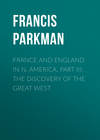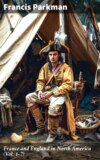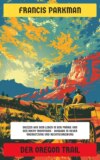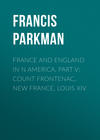Kitabı oku: «France and England in N. America, Part III: The Discovery of the Great West», sayfa 10
CHAPTER XIII. 1679-1680. LA SALLE ON THE ILLINOIS
THE ST. JOSEPH.—ADVENTURE OF LA SALLE.—THE PRAIRIES.—FAMINE. —THE GREAT TOWN OF THE ILLINOIS.—INDIANS.—INTRIGUES.– DIFFICULTIES.—POLICY OF LA SALLE.—DESERTION.—ANOTHER ATTEMPT TO POISON HIM.
On the third of December, the party re-embarked, thirty-three in all, in eight canoes, [Footnote: Lettre de Duchesneau à—, 10 Nov. 1680, MS.] and ascended the chill current of the St. Joseph, bordered with dreary meadows and bare gray forests. When they approached the site of the present village of South Bend, they looked anxiously along the shore on their right to find the portage or path leading to the headquarters of the Illinois. The Mohegan was absent, hunting; and, unaided by his practised eye, they passed the path without seeing it. La Salle landed to search the woods. Hours passed, and he did not return. Hennepin and Tonty grew uneasy, disembarked, bivouacked, ordered guns to be fired, and sent out men to scour the country. Night came, but not their lost leader. Muffled in their blankets and powdered by the thick-falling snowflakes, they sat ruefully speculating as to what had befallen him; nor was it till four o'clock of the next afternoon that they saw him approaching along the margin of the river. His face and hands were besmirched with charcoal; and he was farther decorated with two opossums which hung from his belt and which he had killed with a stick as they were swinging head downwards from the bough of a tree, after the fashion of that singular beast. He had missed his way in the forest, and had been forced to make a wide circuit around the edge of a swamp; while the snow, of which the air was full, added to his perplexities. Thus he pushed on through the rest of the day and the greater part of the night, till, about two o'clock in the morning, he reached the river again and fired his gun as a signal to his party. Hearing no answering shot, he pursued his way along the bank, when he presently saw the gleam of a fire among the dense thickets close at hand. Not doubting that he had found the bivouac of his party, he hastened to the spot. To his surprise, no human being was to be seen. Under a tree beside the fire was a heap of dry grass impressed with the form of a man who must have fled but a moment before, for his couch was still warm. It was no doubt an Indian, ambushed on the bank, watching to kill some passing enemy. La Salle called out in several Indian languages; but there was dead silence all around. He then, with admirable coolness, took possession of the quarters he had found, shouting to their invisible proprietor that he was about to sleep in his bed; piled a barricade of bushes around the spot, rekindled the dying fire, warmed his benumbed hands, stretched himself on the dried grass, and slept undisturbed till morning.
The Mohegan had rejoined the party before La Salle's return, and with his aid the portage was soon found. Here the party encamped. La Salle, who was excessively fatigued, occupied, together with Hennepin, a wigwam covered in the Indian manner with mats of reeds. The cold forced them to kindle a fire, which before daybreak set the mats in a blaze; and the two sleepers narrowly escaped being burned along with their hut.
In the morning, the party shouldered their canoes and baggage, and began their march for the sources of the River Illinois, some five miles distant. Around them stretched a desolate plain, half-covered with snow, and strewn with the skulls and bones of buffalo; while, on its farthest verge, they could see the lodges of the Miami Indians, who had made this place their abode. They soon reached a spot where the oozy saturated soil quaked beneath their tread. All around were clumps of alderbushes, tufts of rank grass, and pools of glistening water. In the midst, a dark and lazy current, which a tall man might bestride, crept twisting like a snake among the weeds and rushes. Here were the sources of the Kankakee, one of the heads of the Illinois. [Footnote: The Kankakee was called at this time the Theakiki, or Haukiki (Marest); a name, which, as Charlevoix says, was afterwards corrupted by the French to Kiakiki, whence, probably, its present form. In La Salle's time, the name Theakiki was given to the River Illinois, through all its course. It was also called the Rivière Seignelay, the Rivière des Macopins, and the Rivière Divine, or Rivière de la Divine. The latter name, when Charlevoix visited the country in 1721, was confined to the northern branch. He gives an interesting and somewhat graphic account of the portage and the sources of the Kankakee, in his letter dated De la Source du Theakiki, ce dix-sept Septembre, 1721.
Why the Illinois should ever have been called the Divine, it is not easy to see. The Memoirs of St. Simon suggest an explanation. Madame de Frontenac and her friend, Mademoiselle d'Outrelaise, he tells us, lived together in apartments at the Arsenal, where they held their salon and exercised a great power in society. They were called at court les Divines.—St. Simon, v. 835 (Cheruel). In compliment to Frontenac, the river may have been named after his wife or her friend. The suggestion is due to M. Margry. I have seen a map by Raudin, Frontenac's engineer, on which the river is called "Rivière de la Divine ou l'Outrelaise."] They set their canoes on this thread of water, embarked their baggage and themselves, and pushed down the sluggish streamlet, looking, at a little distance, like men who sailed on land. Fed by an unceasing tribute of the spongy soil, it quickly widened to a river; and they floated on their way through a voiceless, lifeless solitude of dreary oak barrens, or boundless marshes overgrown with reeds. At night, they built their fire on ground made firm by frost, and bivouacked among the rushes. A few days brought them to a more favored region. On the right hand and on the left stretched the boundless prairie, dotted with leafless groves and bordered by gray wintry forests; scorched by the fires kindled in the dried grass by Indian hunters, and strewn with the carcasses and the bleached skulls of innumerable buffalo. The plains were scored with their pathways, and the muddy edges of the river were full of their hoof-prints. Yet not one was to be seen. At night, the horizon glowed with distant fires; and by day the savage hunters could be descried at times roaming on the verge of the prairie. The men, discontented and half-starved, would have deserted to them had they dared. La Salle's Mohegan could kill no game except two lean deer, with a few wild geese and swans. At length, in their straits, they made a happy discovery. It was a buffalo bull, fast mired in a slough. They killed him, lashed a cable about him, and then twelve men dragged out the shaggy monster whose ponderous carcass demanded their utmost efforts. [Footnote: I remember to have seen an incident precisely similar, many years ago, on the Upper Arkansas. In this case, however, it was impossible to drag the bull from the mire. Though hopelessly entangled, he made furious plunges at his assailants before being shot.
Hennepin's account of the buffalo, which he afterwards had every opportunity of seeing, is interesting and true.]
The scene changed again as they descended. On either hand ran ranges of woody hills, following the course of the river; and when they mounted to their tops, they saw beyond them a rolling sea of dull green prairie, a boundless pasture of the buffalo and the deer, in our own day strangely transformed,—yellow in harvest time with ripened wheat, and dotted with the roofs of a hardy and valiant yeomanry. [Footnote: The change is very recent. Within the memory of men still young, wolves and deer, besides wild swans, wild turkeys, cranes, and pelicans, abounded in this region. In 1840, a friend of mine shot a deer from the window of a farm-house near the present town of La Salle. Running wolves on horseback was his favorite amusement in this part of the country. The buffalo long ago disappeared, but the early settlers found frequent remains of them. Mr. James Clark, of Utica, Ill., told me that he once found a large quantity of their bones and skulls in one place, as if a herd had perished in the snow-drifts.]
They passed the site of the future town of Ottawa, and saw on their right the high plateau of Buffalo Rock, long a favorite dwelling-place of Indians. A league below, the river glided among islands bordered with stately woods. Close on their left towered a lofty cliff, [Footnote: "Starved Rock." It will hold, hereafter, a conspicuous place in the narrative.] crested with trees that overhung the rippling current; while before them spread the valley of the Illinois, in broad low meadows, bordered on the right by the graceful hills at whose foot now lies the village of Utica. A population far more numerous then tenanted the valley. Along the right bank of the river were clustered the lodges of a great Indian town. Hennepin counted four hundred and sixty of them. [Footnote: La Louisiane, 137. Allouez (Relation, 1673-9) found three hundred and fifty-one lodges. This was in 1677. The population of this town, which embraced five or six distinct tribes of the Illinois, was continually changing. In 1675, Marquette addressed here an auditory composed of five hundred chiefs and old men, and fifteen hundred young men, besides women and children. He estimates the number of fires at five or six hundred.– Voyages de Père Marquette, 98 (Lenox). Membré, who was here in 1680, says that it then contained seven or eight thousand souls.—Membré, in Le Clercq, Premier Etablissement de la Foy, ii. 173. On the remarkable manuscript map of Franquelin, 1684, it is set down at twelve hundred warriors, or about six thousand souls. This was after the destructive inroad of the Iroquois. Some years later, Rasle reported upwards of twenty-four hundred families.—Lettre à son Frère in Lettres Edifiantes.
At times, nearly the whole Illinois population was gathered here. At other times, the several tribes that composed it separated, some dwelling apart from the rest; so that at one period the Illinois formed eleven villages, while at others they were gathered into two, of which this was much the largest. The meadows around it were extensively cultivated, yielding large crops, chiefly of Indian corn. The lodges were built along the river bank, for a distance of a mile and sometimes far more. In their shape, though not in their material, they resembled those of the Hurons. There were no palisades or embankments.
This neighborhood abounds in Indian relics. The village graveyard appears to have been on a rising ground, near the river, immediately in front of the town of Utica. This is the only part of the river bottom, from this point to the Mississippi, not liable to inundation in the spring floods. It now forms part of a farm occupied by a tenant of Mr. James Clark. Both Mr. Clark and his tenant informed me that every year great quantities of human bones and teeth were turned up here by the plough. Many implements of stone are also found, together with beads and other ornaments of Indian and European fabric.] In shape, they were somewhat like the arched top of a baggage wagon. They were built of a framework of poles, covered with mats of rushes, closely interwoven; and each contained three or four fires, of which the greater part served for two families.
Here, then, was the town; but where were the inhabitants? All was silent as the desert. The lodges were empty, the fires dead, and the ashes cold. La Salle had expected this; for he knew that in the autumn the Illinois always left their towns for their winter hunting, and that the time of their return had not yet come. Yet he was not the less embarrassed, for he would fain have bought a supply of food to relieve his famished followers. Some of them, searching the deserted town, presently found the caches, or covered pits, in which the Indians hid their stock of corn. This was precious beyond measure in their eyes, and to touch it would be a deep offence. La Salle shrank from provoking their anger, which might prove the ruin of his plans; but his necessity overcame his prudence, and he took twenty minots of corn, hoping to appease the owners by presents. Thus provided, the party embarked again, and resumed their downward voyage.
On New-Year's day, 1680, they landed and heard mass. Then Hennepin wished a happy new year to La Salle first, and afterwards to all the men, making them a speech, which, as he tells us, was "most touching." [Footnote: "Les paroles les plus touchantes." Hennepin (1683), 139. The later editions add the modest qualification, "que je pus."] He and his two brethren next embraced the whole company in turn, "in a manner," writes the father, "most tender and affectionate," exhorting them, at the same time, to patience, faith, and constancy. Two days after these solemnities, they reached the long expansion of the river, then called Pimitoui, and now known as Peoria Lake, and leisurely made their way downward to the site of the city of Peoria. [Footnote: Peoria was the name of one of the tribes of the Illinois. Hennepin says that they crossed the lake four days after leaving the village, which last, as appears by a comparison of his narrative with that of Tonty, must have been on the thirtieth of December.] Here, as evening drew near, they saw a faint spire of smoke curling above the gray, wintry forest, betokening that Indians were at hand. La Salle, as we have seen, had been warned that these tribes had been taught to regard him as their enemy; and when, in the morning, he resumed his course, he was prepared alike for peace or war.
The shores now approached each other; and the Illinois was once more a river, bordered on either hand with overhanging woods. [Footnote: At least it is so now at this place. Perhaps in La Salle's time it was not wholly so, for there is evidence in various parts of the West that the forest has made considerable encroachments on the open country.]
At nine o'clock, doubling a point, he saw about eighty Illinois wigwams, on both sides of the river. He instantly ordered the eight canoes to be ranged in line, abreast, across the stream; Tonty on the right, and he himself on the left. The men laid down their paddles and seized their weapons; while, in this warlike guise, the current bore them swiftly into the midst of the surprised and astounded savages. The camps were in a panic. Warriors whooped and howled; squaws and children screeched in chorus. Some snatched their bows and war-clubs; some ran in terror; and, in the midst of the hubbub, La Salle leaped ashore, followed by his men. None knew better how to deal with Indians; and he made no sign of friendship, knowing that it might be construed as a token of fear. His little knot of Frenchmen stood, gun in hand, passive, yet prepared for battle. The Indians, on their part, rallying a little from their fright, made all haste to proffer peace. Two of their chiefs came forward, holding forth the calumet; while another began a loud harangue, to check the young warriors who were aiming their arrows from the farther bank. La Salle, responding to these friendly overtures, displayed another calumet; while Hennepin caught several scared children and soothed them with winning blandishments. [Footnote: Hennepin (1683), 142.] The uproar was quelled, and the strangers were presently seated in the midst of the camp, beset by a throng of wild and swarthy figures.
Food was placed before them; and, as the Illinois code of courtesy enjoined, their entertainers conveyed the morsels with their own hands to the lips of these unenviable victims of their hospitality, while others rubbed their feet with bear's grease. La Salle, on his part, made them a gift of tobacco and hatchets; and, when he had escaped from their caresses, rose and harangued them. He told them that he had been forced to take corn from their granaries, lest his men should die of hunger; but he prayed them not to be offended, promising full restitution or ample payment. He had come, he said, to protect them against their enemies, and teach them to pray to the true God. As for the Iroquois, they were subjects of the Great King, and, therefore, brethren of the French; yet, nevertheless, should they begin a war and invade their country, he would stand by the Illinois, give them guns, and fight in their defence, if they would permit him to build a fort among them for the security of his men. It was, also, he added, his purpose to build a great wooden canoe, in which to descend the Mississippi to the sea, and then return, bringing them the goods of which they stood in need; but if they would not consent to his plans, and sell provisions to his men, he would pass on to the Osages, who would then reap all the benefits of intercourse with the French, while they were left destitute, at the mercy of the Iroquois. [Footnote: Hennepin (1683), 144-149. The later editions omit a part of the above.]
This threat had its effect, for it touched their deep-rooted jealousy of the Osages. They were lavish of promises, and feasts and dances consumed the day. Yet La Salle soon learned that the intrigues of his enemies were still pursuing him. That evening, unknown to him, a stranger appeared in the Illinois camp. He was a Mascoutin chief, named Monso, attended by five or six Miamis, and bringing a gift of knives, hatchets, and kettles to the Illinois. The chiefs assembled in a secret nocturnal session, where, smoking their pipes, they listened with open ears to the harangue of the envoys. Monso told them that he had come in behalf of certain Frenchmen, whom he named, to warn his hearers against the designs of La Salle, whom he denounced as a partisan and spy of the Iroquois, affirming that he was now on his way to stir up the tribes beyond the Mississippi to join in a war against the Illinois, who, thus assailed from the east and from the west, would be utterly destroyed. There was no hope for them, he added, but in checking the farther progress of La Salle, or, at least, retarding it, thus causing his men to desert him. Having thrown his firebrand, Monso and his party left the camp in haste, dreading to be confronted with the object of their aspersions. [Footnote: Hennepin (1683), 151, (1704), 205. Le Clercq, ii. 157. Mémoire du Voyage de M. de la Salle, MS. This is a paper appended to Frontenac's Letter to the Minister, 9 Nov. 1680. Hennepin prints a translation of it in the English edition of his later work. It charges the Jesuit Allouez with being at the bottom of the intrigue. La Salle had a special distrust of this missionary, who, on his part, always shunned a meeting with him.
In another memoir, addressed to Frontenac in 1680, La Salle states fully his conviction that Allouez, who was then, he says, among the Miamis, had induced them to send Monso on his sinister errand. See the memoir in Thomassy, Géologie, Pratique de la Louisiane, 203.
The account of the affair of Monso in the spurious work bearing Tonty's name is mere romance.]
In the morning, La Salle saw a change in the behavior of his hosts. They looked on him askance, cold, sullen, and suspicious. There was one Omawha, a chief, whose favor he had won the day before by the politic gift of two hatchets and three knives, and who now came to him in secret to tell him what had taken place at the nocturnal council. La Salle at once saw in it a device of his enemies; and this belief was confirmed, when, in the afternoon, Nicanopé, brother of the head chief, sent to invite the Frenchmen to a feast. They repaired to his lodge; but before dinner was served,—that is to say, while the guests, white and red, were seated on mats, each with his hunting-knife in his hand, and the wooden bowl before him, which was to receive his share of the bear's or buffalo's meat, or the corn boiled in fat, with which he was to be regaled; while such was the posture of the company, their host arose and began a long speech. He told the Frenchmen that he had invited them to his lodge less to refresh their bodies with good cheer than to cure their minds of the dangerous purpose which possessed them, of descending the Mississippi. Its shores, he said, were beset by savage tribes, against whose numbers and ferocity their valor would avail nothing: its waters were infested by serpents, alligators, and unnatural monsters; while the river itself, after raging among rocks and whirlpools, plunged headlong at last into a fathomless gulf, which would swallow them and their vessel for ever.
La Salle's men were, for the most part, raw hands, knowing nothing of the wilderness, and easily alarmed at its dangers; but there were two among them, old coureurs de bois, who, unfortunately, knew too much; for they understood the Indian orator, and explained his speech to the rest. As La Salle looked around on the circle of his followers, he read an augury of fresh trouble in their disturbed and rueful visages. He waited patiently, however, till the speaker had ended, and then answered him, through his interpreter, with great composure. First, he thanked him for the friendly warning which his affection had impelled him to utter; but, he continued, the greater the danger, the greater the honor; and even if the danger were real, Frenchmen would never flinch from it. But were not the Illinois jealous? Had they not been deluded by lies? "We were not asleep, my brother, when Monso came to tell you, under cover of night, that we were spies of the Iroquois. The presents he gave you, that you might believe his falsehoods, are at this moment buried in the earth under this lodge. If he told the truth, why did he skulk away in the dark? Why did he not show himself by day? Do you not see that when we first came among you, and your camp was all in confusion, we could have killed you without needing help from the Iroquois? And now, while I am speaking, could we not put your old men to death, while your young warriors are all gone away to hunt? If we meant to make war on you, we should need no help from the Iroquois, who have so often felt the force of our arms. Look at what we have brought you. It is not weapons to destroy you, but merchandise and tools, for your good. If you still harbor evil thoughts of us, be frank as we are, and speak them boldly. Go after this impostor, Monso, and bring him back, that we may answer him, face to face; for he never saw either us or the Iroquois, and what can he know of the plots that he pretends to reveal?" [Footnote: The above is a paraphrase, with some condensation, from Hennepin, whose account is sustained by the other writers.] Nicanopé had nothing to reply, and, grunting assent in the depths of his throat, made a sign that the feast should proceed.
The French were lodged in huts, near the Indian camp; and, fearing treachery, La Salle placed a guard at night. On the morning after the feast, he came out into the frosty air, and looked about him for the sentinels. Not one of them was to be seen. Vexed and alarmed, he entered hut after hut, and roused his drowsy followers. Six of the number, including two of the best carpenters, were nowhere to be found. Discontented and mutinous from the first, and now terrified by the fictions of Nicanopé, they had deserted, preferring the hardships of the midwinter forest to the mysterious terrors of the Mississippi. La Salle mustered the rest before him, and inveighed sternly against the cowardice and baseness of those who had thus abandoned him, regardless of his many favors. If any here, he added, are afraid, let them but wait till the spring, and they shall have free leave to return to Canada, safely and without dishonor. [Footnote: Hennepin (1683), 162.—Déclaration faite par Moyse Hillaret, charpentier de barque, cy devant au service du Sr. de la Salle, MS.]
This desertion cut him to the heart. It showed him that he was leaning on a broken reed; and he felt that, on an enterprise full of doubt and peril, there were scarcely four men in his party whom he could trust. Nor was desertion the worst he had to fear; for here, as at Fort Frontenac, an attempt was made to kill him. Tonty tells us that poison was placed in the pot in which their food was cooked, and that La Salle was saved by an antidote which some of his friends had given him before he left France. This, it will be remembered, was an epoch of poisoners. It was in the following month that the notorious La Voisin was burned alive, at Paris, for practices to which many of the highest nobility were charged with being privy, not excepting some in whose veins ran the blood of the gorgeous spendthrift who ruled the destinies of France. [Footnote: The equally famous Brinvilliers was burned four years before. An account of both will be found in the Letters of Madame de Sevigné. The memoirs of the time abound in evidence of the frightful prevalence of these practices, and the commotion which they excited in all ranks of society.]
In these early French enterprises in the West, it was to the last degree difficult to hold men to their duty. Once fairly in the wilderness, completely freed from the sharp restraints of authority in which they had passed their lives, a spirit of lawlessness broke out among them with a violence proportioned to the pressure which had hitherto controlled it. Discipline had no resources and no guarantee; while those outlaws of the forest, the coureurs de bois, were always before their eyes, a standing example of unbridled license. La Salle, eminently skilful in his dealings with Indians, was rarely so happy with his own countrymen; and yet the desertions from which he was continually suffering were due far more to the inevitable difficulty of his position than to any want of conduct.









